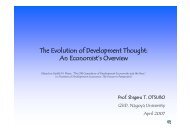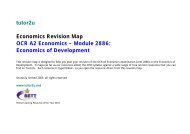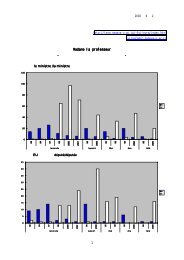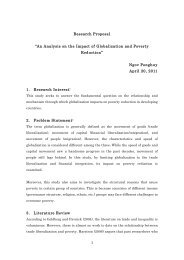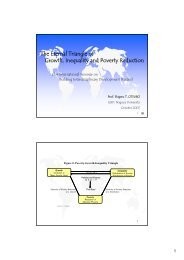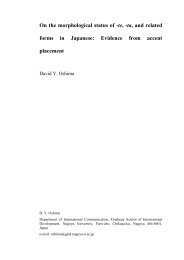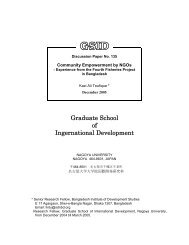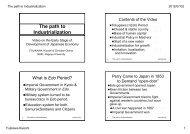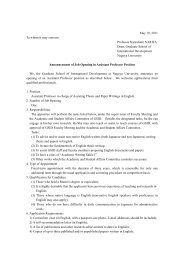Report
Report
Report
Create successful ePaper yourself
Turn your PDF publications into a flip-book with our unique Google optimized e-Paper software.
16 Cross-Cutting Issues and Conclusion<br />
Apart from the sector specific issues, which have been<br />
discussed in respective sectoral chapters, there are some<br />
cross-cutting issues which are relevant to many services<br />
sectors particularly construction, education, health and<br />
tourism services. Issues such as developing MRAs,<br />
issuance of visa, conducive FDI regime and uniform<br />
taxation policy are some of the cross-cutting issues<br />
which warrant more detailed discussion. While the<br />
former two issues can be addressed with a view to<br />
facilitating movement of service providers in the region,<br />
the latter ones can have very positive implications<br />
especially on commercial presence. Thus all South Asian<br />
countries are expected to address these issues if they<br />
wish to gain from trade in services.<br />
MUTUAL RECOGNITION AGREEMENTS<br />
As discussed in the previous chapters, developing MRAs<br />
is a crucial element for delivery of services particularly<br />
through Mode 4. Lack of recognition of qualifications,<br />
skills, or experience is one of the most common barriers<br />
affecting Mode 4 (Chanda 2005). It either denies<br />
market access altogether to foreign service providers<br />
or induce such suppliers to perform in a capacity that<br />
is below their level of qualifications (academic or<br />
otherwise). The mechanisms for assessment of<br />
equivalence of qualification, licensing, and other<br />
requirement related regulations with a view to<br />
improving market access have been developed under a<br />
number of regional arrangements – the prominent<br />
examples being the European Union, NAFTA, TTMRA<br />
(between Australia and New Zealand), etc. Since the<br />
area of domestic regulation is not covered by market<br />
access commitments the issue becomes all the more<br />
important. Under the GATS thus far not much progress<br />
has been made. India raised the issue of implementation<br />
of obligations under Article VII of GATS on recognition<br />
in the special sessions of CTS vide its negotiating<br />
proposal on Mode 4. 1 India rightly considers that<br />
obligations under Article VII are an area of crucial<br />
significance, especially for professional services. It has<br />
also an impact on the value of commitments for<br />
professional services because the value of such<br />
commitments is greatly affected by the manner in which<br />
such obligations carried out by members.<br />
On India’s request when the WTO secretariat<br />
compiled the notification obligations in 2003, it was<br />
found that during the past three years only two such<br />
agreements had been notified by members as required<br />
under Article VII: 4 (c). 2 The sectors to which such<br />
notifications refer are often unclear from the notifications.<br />
Moreover, as all the agreements notified so far<br />
had been post-facto notifications, adequate opportunities<br />
were not provided to other members to indicate<br />
their interest in participating in these negotiations and<br />
negotiating their accession to such agreements or negotiating<br />
comparable one with the member(s) concerned.<br />
Issues relating to recognition are also closely linked<br />
to the mandate in Article VI: 4 regarding disciplines<br />
for qualifications requirements and procedures,<br />
licensing requirements and procedures and technical<br />
standards as all such measures have a bearing on<br />
recognition (India 2003). Thus recognition is one of<br />
the core issues under the work programme of the working<br />
party on domestic regulation (WPDR). India views<br />
the progress with respect to recognition issues as one<br />
of the crucial elements for effective market access in<br />
Mode 4 especially for professional services. Lack of<br />
recognition can act as a significant barrier to providing<br />
services under Mode 4. In light of this, India suggests<br />
that the WPDR should consider the following alternative<br />
approaches for addressing the issue of recognition.<br />
These approaches can possibly be undertaken in<br />
parallel:<br />
1<br />
India’s Negotiating Proposal on Mode 4, WTO Document, S/CSS/W/12, 24 November 2000.<br />
2<br />
WTO Communication from India, Implementation of Article VII of GATS, JOB (03)/120, 24 June 2003, http:/<br />
www.commerce.gov.in/trade/international_trade_services_informal_papers_1.asp last visited on 1 November 2007.




